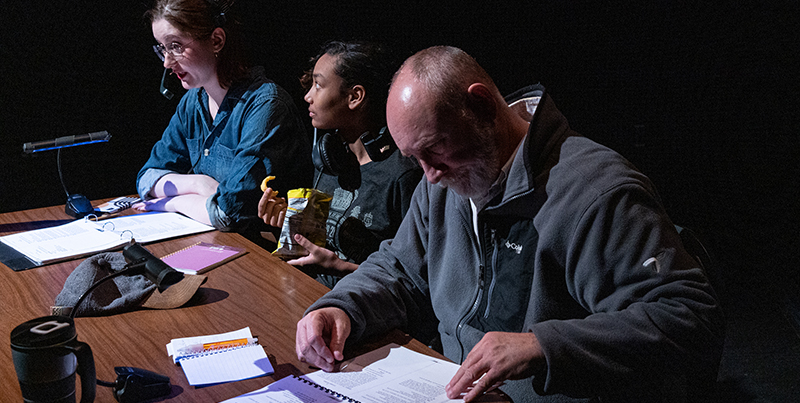“I don’t usually love plays that are about plays”, Parkland College theater director Benjamin Gailey began when asked about the appeal of Parkland’s upcoming production 10 out of 12, “but this one is more like a time capsule or a documentary—it’s so realistic, and that’s where a lot of the comedy and the drama comes from.”
Debuting at Parkland College on February 17th, the Parkland production of Anne Washburn’s 10 out of 12, is set to immerse audiences in the dramatic, grueling, and sometimes unnerving events of the theater tech rehearsal.
The tech rehearsal is an infamous event to people in the theater world. It is a day about a week or so before opening where all the parts of a production—lights, sound, and acting— come together for the first time, making it the most strenuous time of the production process. These rehearsals are usually scheduled as 12 hour days, however, an equity mandate requires actors to work no more than 10 of those hours, which is the inspiration for the title of the play 10 out of 12.
As an award winning playwright who has been in the industry for over two decades, Anne Washburn’s portrayal of a tech rehearsal for the hopelessly behind schedule fictional play Delirious is spot on. It combines dramatic accuracy with dashes of comedy to create not only an enjoyable audience experience, but a viewing window into the production process that made the play possible. When asked about 10 out of 12’s accuracy, Gailey exclaimed “It is identical.” He followed up by commenting that “(accuracy) is what makes the show so fun- it’s such an accurate record of the most stressful and difficult part of any production”.
To immerse the audience in such an accurate rehearsal portrayal, the script is coated in passing actor and crew conversations that will give viewers a backstage feel to the show. In order to capture every moment on and off the stage, the production uses radio or speakers to play backstage conversation. For Parkland’s production, Gailey says “we are using a lot of directional sound to replicate that experience of hearing things you otherwise wouldn’t”, further contributing to the immersion.
Not only is the dialogue realistic to a rehearsal, but so is the spacing and positioning of the cast. When in rehearsal, breaks from takes mean that the cast won’t be as concerned with speaking out towards the audience or bustling around each other as mandated by the script. While furthering the realism of the play, it meant a lot of the basics were thrown out the window, creating some unexpected challenges. When commenting on these obstacles, Gailey said:
“We learn to move a certain way in theatre- making sure not to upstage people, making sure to turn out so the audience can see and hear us clearly. In this play the audience needs to feel like they’re in the middle of the rehearsal itself, which meant thinking about space in a very realistic way instead of a theatrical one—so there’s some moments of characters with their backs to the audience, deliberate upstaging, and multiple points of focus and overlapping of lines. The cast has had to unlearn some of their theatrical habits in a way.”
The unorthodox production was a new experience for many in the cast and crew, but through the fire, the show is set to bring it’s presentation of the excitement, laughs, and stresses of tech rehearsals to the Parkland College stage this Thursday, February 17th at 7:30 p.m.
10 out of 12
February 17th-19th, 25th + 26th, 7:30 p.m.
February 20th + 27th, 3 p.m.
Parkland College
Harold & Jean Miner Theatre
Second Stage
Tickets: $16-$20, reserve online








